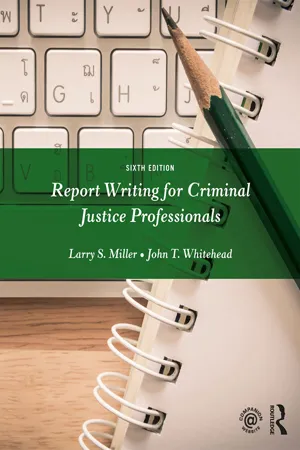
Report Writing for Criminal Justice Professionals
- 420 pages
- English
- ePUB (mobile friendly)
- Available on iOS & Android
Report Writing for Criminal Justice Professionals
About this book
The criminal justice process is dependent on accurate documentation. Criminal justice professionals can spend 50–75 percent of their time writing administrative and research reports. The information provided in these reports is crucial to the functioning of our system of justice. Report Writing for Criminal Justice Professionals, Sixth Edition, provides practical guidance—with specific writing samples and guidelines—for providing strong reports. Most law enforcement, security, corrections, and probation and parole officers have not had adequate training in how to provide well-written, accurate, brief, and complete reports. Report Writing for Criminal Justice Professionals covers everything officers need to learn—from basic English grammar to the difficult but often-ignored problem of creating documentation that will hold up in court. This new edition includes updates to reference materials and citations, as well as further supporting examples and new procedures in digital and electronic report writing.
Tools to learn more effectively

Saving Books

Keyword Search

Annotating Text

Listen to it instead
Information
Section 1
The Nature of Report Writing
Chapter 1
The Why and How of Report Writing
Why Do You Write Reports?
Law Enforcement Reports
Operational Purposes
- 1. Document actions taken by persons involved in crimes, incidents, and accidents, as well as actions taken by you and your fellow officers.
- 2. Give pertinent facts that will help determine if follow-up is required by you or anyone else.
- 3. Help the prosecutor decide whether to charge an individual, and if so, with what charge. (If the prosecutor charges the suspect with Crime X when testimony shows Crime Y was more important, the defendant may be released.)
- 4. Point out a pattern of action, a modus operandi or method of operation (MO) taken to commit the crime, or a trademark, a habit that may even slow down the action, but that is characteristic of a certain perpetrator. This can help to show similarities between crimes and is an important investigative aid.
- 5. Help you recall details of a case when you testify months or years later. Your report may also protect you against a civil suit.
- 6. Help you or others to keep track of what has been done on an investigation and what needs to be done, and to help coordinate activities between investigators and agencies involved in the investigation.
- 7. Pinpoint times and places with a high incidence of crime so that officers can be deployed to the best advantage. This can provide help for you when you need it most.
Administrative Purposes
- 1. Determine what type of administrative action or follow-up is needed.
- 2. Send materials to other agencies, states, or the federal government, and even to other countries. The FBI has been gathering statistics on a voluntary basis for the Uniform Crime Reports (UCR) for more than 80 years. The National Incident-Based Reporting System (NIBRS) will eventually replace the UCR and goes into even greater depth with crime reporting.
- 3. Assist in obtaining cooperation in community policing to better serve the area and enhance public relations.
- 4. Form the backbone of reports to the upper echelon in your city or state, including the mayor, governor, and members of the legislature. Such reports document problems, progress, and possible solutions, and the information is used to budget money. Your equipment, assistance, and paycheck may hang in the balance.
- 5. Help management determine training needs and assist in quality control efforts within the agency.
- 6. Determine who receives advancements or transfers. People are often judged and selected for advancement or transfer based on their writing and communication skills.
Security Reports
Operational Purposes
- 1. Note problems that may hinder the smooth working of the facility or business. (Preexisting dangerous conditions that are not taken care of can form bases for lawsuits.)
- 2. Prevent employee theft and shoplifting from businesses.
- 3. Promote a favorable image of the company, facility, or organization by solving problems in-house, whenever possible.
- 4. Document courteous responses to public demands.
Administrative Purposes
- 1. Help protect stockholders by documenting specific needs and justifiable expenditures.
- 2. Help secure funds to support such places as museums, performing arts facilities, and colleges.
- 3. Can be used to cooperate with similar facilities, such as other hotels and hospitals, to share information about swindlers, drug dealers, con artists, and other threats to security.
Corrections Reports
Probation and Parole Officer Reports
Table of contents
- Cover
- Title
- Copyright
- Dedication
- Contents
- Acknowledgments
- Introduction
- Section 1 The Nature of Report Writing
- Section 2 The Mechanics of Report Writing
- Section 3 The Modernization of Report Writing
- Appendix A: Model Reports
- Appendix B: Examples of Agency Instructions for Completing Report Forms
- Appendix C: Selected Readings
- References
- Index
Frequently asked questions
- Essential is ideal for learners and professionals who enjoy exploring a wide range of subjects. Access the Essential Library with 800,000+ trusted titles and best-sellers across business, personal growth, and the humanities. Includes unlimited reading time and Standard Read Aloud voice.
- Complete: Perfect for advanced learners and researchers needing full, unrestricted access. Unlock 1.4M+ books across hundreds of subjects, including academic and specialized titles. The Complete Plan also includes advanced features like Premium Read Aloud and Research Assistant.
Please note we cannot support devices running on iOS 13 and Android 7 or earlier. Learn more about using the app